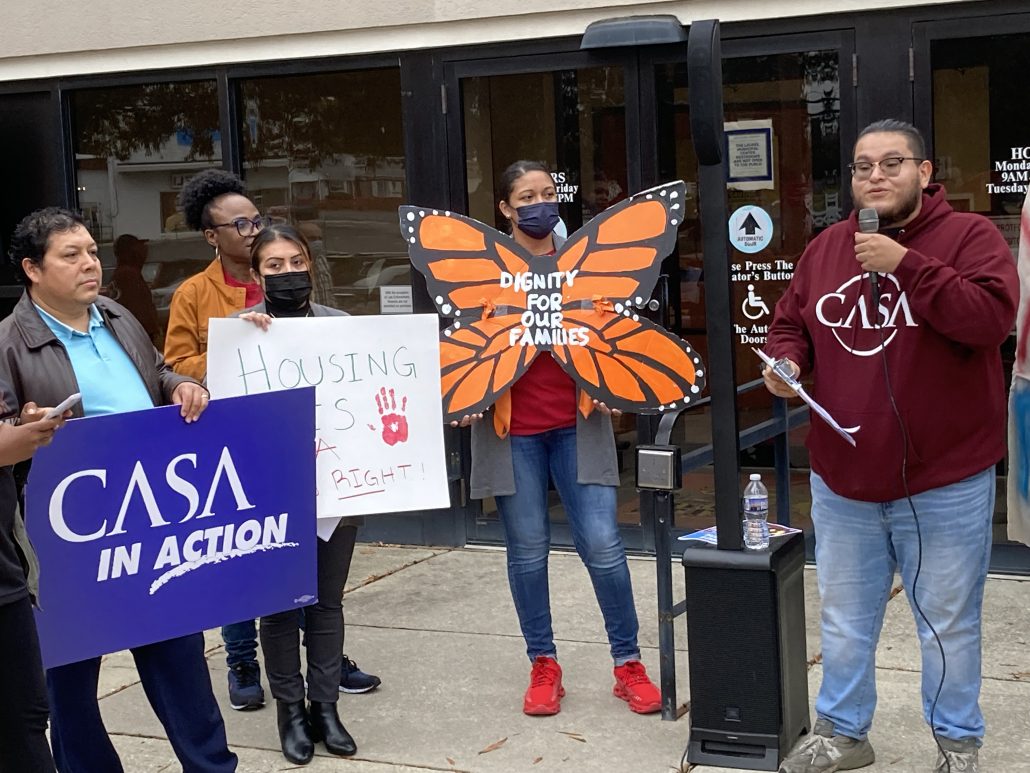By Joe Murchison
Laurel’s mayor and City Council are likely to pass legislation to help renters stay in their homes but are still discussing specifics, according to Bencis Smith (Ward 2), the council’s president.
“We’re all in agreement that something needs to be done,” he said following an Oct. 24 public hearing where 17 renters and others testified before a standing-room-only audience.
“This is the fullest I’ve seen this room,” Councilmember Martin Mitchell (At Large) commented.
Prior to the hearing, Casa de Maryland and other organizations that have formed the Laurel Housing Justice Coalition held a demonstration in front of the Laurel Municipal Center to call on the mayor and council to enact a cap on rent increases.

Photo Credit: Joe Murchison
A bill to establish an annual 3% cap on increases has been introduced by two councilmembers, Mitchell and Carl DeWalt (Ward 1). Mayor Craig Moe has presented the council with a packet of possible measures that includes a rent cap of up to 4%. Other councilmembers have suggested higher caps, Smith said. These proposals include an appeal process through which landlords can argue for a higher increase because of improvements they’ve made or other circumstances.
If the city adopts a rent-increase cap, it will be a rarity. The only city in Maryland that currently has a cap is Takoma Park, which limits increases to the rate of inflation as measured by the region’s Consumer Price Index. This year, Takoma Park’s cap is 7.3%. The city has had a rent stabilization law in place since 1987.
State Del. Mary Lehman (District 21), who is a Laurel resident, urged the City Council to pass a cap. “Rising rents are displacing more and more tenants,” she said. “Rents increasing 20%, 30%, 40% are not affordable for working people.”
Before the hearing, Lehman said that she had been frustrated trying to enact tenant protections during her 12 years on the Prince George’s County Council and in the Maryland House of Delegates. “The landlords have all the power; the tenants have very little,” she said.
Only one of the 17 people testifying at the public hearing spoke in opposition to a rent-increase cap. Ryan Washington, of the Apartment and Office Building Association of Metropolitan Washington, said, “Our members are not immune to the inflation and supply chain challenges, as many housing providers are facing significant rises in the cost of water, electricity, gas, insurance and property taxes. Additionally, AOBA members are still reeling from historic rent delinquencies and dramatic outstanding rent balances.”
Washington said landlords in his association had reported rent increases this year that averaged 3.4%.
CASA de Maryland, an immigrant advocacy group, and councilmembers DeWalt and Mitchell became involved in Laurel renter issues last winter when they learned that landlords who had acquired several local apartment complexes had notified tenants of rent increases of 20%, 60% and even 100%. The organization and councilmembers were able to negotiate with the landlords to reduce the increases and also tap the city’s federal American Rescue Plan Act of 2021 (ARPA) funds to subsidize the rents.
But at the rally before the council hearing, CASA organizer Jorge Benitez-Perez noted some of those negotiated rents are ending in February, 2023. “We want the council to move ahead immediately with rent control,” he said.
Rose Thompson was one of several tenants who spoke at the rally. Thompson said she had lived in her apartment on 11th Street for 25 years when she received a letter from the new landlord doubling her rent to $1,600. CASA and the two councilmembers were able to negotiate the rent down to $1,000, and the city used ARPA funds to subsidize $350 per month through February. “I am grateful,” she said. “But the time is coming when we have to leave.”
Kia Jefferson said she had lived for 17 years in the Patuxent Place complex on Main Street. “I love my apartment, I love Laurel,” she said. But last winter she received notice from her new landlord of an $800 rent increase, from $1,300 to $2,100. CASA and the two councilmembers negotiated her rent increase down to 13.5%, she said. “But what’s going to happen next year?”
The new landlord in both cases was Cameron Manesh, a Potomac-based commercial real estate broker and investor who also owns Cameron’s Seafood Restaurant in Laurel. Manesh has said he was proud of having responded to tenant concerns, but is opposed to a rent-increase cap.
Elected officials from other jurisdictions attended the rally. Montgomery County Council member Will Jawando said his jurisdiction had adopted a 2% rent increase cap during the pandemic.
“Guess what,” he said. “Landlords kept making money, and people stayed in their homes.” However, he noted that the measure expired in May and that many of the county’s 150,000 renters had since been hit with high increases. He said he was now pushing for a permanent cap.
Jocelyn Route of the Bladensburg City Council also attended.
“We have the same exact situation” as Laurel, she said. She told of an 80-year-old renter who had lived in her apartment for 25 years, but was evicted in August after Schweb Partners, the new landlord, doubled her rent to $1,500. The woman began sleeping on her daughter’s couch until city officials were able to negotiate her rent down to $1,150, still a $400 increase over her previous rent. The woman has moved back in, “but she doesn’t know where that $400 is going to come from,” Route said.
Schweb is the new owner of Westgate of Laurel, one of three complexes where CASA and the councilmembers have tried to mediate large rent increases. Westgate is outside the city limits, so any city legislation would not affect it.
The mayor and council will continue to work on rent legislation at a work session on Nov. 9 at 6 p.m. at the Laurel Municipal Center, 8103 Sandy Spring Road.







